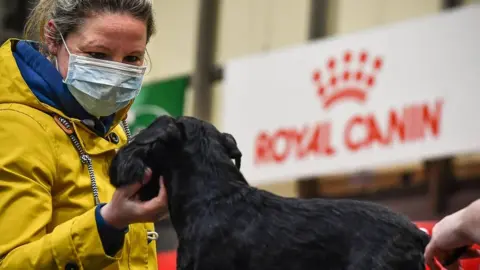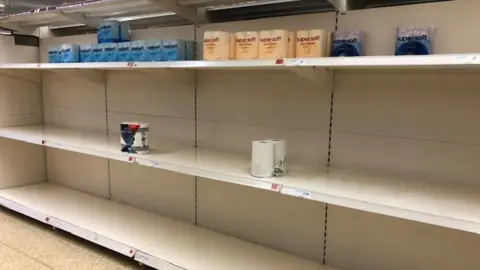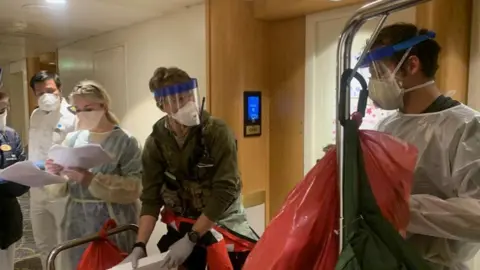Coronavirus: Supermarkets won't run out of food, vows Matt Hancock
The government is "confident" food supplies will not run out, amid concerns over coronavirus, Health Secretary Matt Hancock has said.
He told BBC Question Time individuals should not buy more than they needed.
A supermarket executive told the BBC sales of cupboard basics had "gone through the roof" and he was not sure the government could guarantee food supply in all instances.
The number of confirmed cases in the UK has hit 116 and one person has died.
The first fatality in the UK linked to the virus, which was announced on Thursday, was a woman in her 70s with underlying health conditions.
She was admitted to the Royal Berkshire Hospital in Reading and died after testing positive for the virus.

What do I need to know about the coronavirus?
- LATEST: Live coverage of developments
- EASY STEPS: What can I do?
- GETTING READY: How prepared is the UK?
- MAPS AND CHARTS: Visual guide to the outbreak
- VIDEO: The 20-second hand wash

Responding to a question about panic-buying from a Question Time audience member, Mr Hancock said there was "absolutely no need" for people to buy in excess.
"The government has supplies of the key things that are needed. And within the food supply, we are absolutely confident that there won't be a problem there," he said.
"Crucially, we are working with the supermarkets to make sure that, if people are self-isolating, then we will be able to get the food and supplies that they need."
But a leading supermarket executive told BBC business editor Simon Jack he was baffled by Mr Hancock's claim to be working with supermarkets on this issue, saying: "We haven't heard anything from government directly."
 Getty Images
Getty ImagesHe said sales of cupboard basics such as pasta and tinned goods had "gone through the roof" and teams were working "round the clock" to keep shelves stocked, using processes and staffing levels set up in case of a no-deal Brexit.
"While I think people don't need to panic buy and should just shop normally, I'm not sure the government can guarantee all food supply in all instances," the executive added.
A source at a rival supermarket also raised concerns over whether online deliveries could meet the demands of large number of people in self-isolation, with online delivery usually making up only 6-7% of the overall market.
"We can't switch a whole load of new vans on overnight," the source said.
Downing Street said the Department for Environment, Food and Rural Affairs (Defra) had regular meetings with the food industry to discuss risks to the supply chain, with a working group due to meet on Friday.
"Defra will continue to work on this issue. We have resilient supply chains," a No 10 spokesman said.
The British Retail Consortium, which represents supermarkets, said there had been only limited disruption to supply chains so far and availability of products on shelves remained good.
For self-isolating customers, it said most retailers would be more than happy for online deliveries to delivered to doorsteps.

Prof Chris Whitty, the UK's chief medical adviser, also said there was "no need" for the public to stockpile food or medicine, adding that the outbreak would be a "marathon not a sprint".
The government has said it has a stockpile of important medicines and protective equipment, to counter any impact to global supply chains.
Prof Whitty said of those confirmed to have the virus in the UK, 18 had recovered and around 45 had been self-isolating at home.
"[If] people have very minimal symptoms and we think they are clinically safe and they are able to self-isolate, we think it is actually safer for them as well as more pleasant if they can self-isolate in their own homes," he said, adding that those who need to go to hospital would be treated there.
The number of people self-isolating is likely to rise further after the government said people who developed symptoms after returning from anywhere in Italy - not just the north of the country - should stay at home.
For those returning from the quarantined towns in Italy, people should self-isolate even if they did not show symptoms.

The government's chief scientific adviser, Sir Patrick Vallance, said he did not think a working vaccine to protect people from coronavirus would be produced in time for the current outbreak.
But he told BBC Radio 4's Today programme it was "not unreasonable to assume" there would be a vaccine in a year or 18 months.
Meanwhile, a church in Devon has been closed for a deep clean after a parishioner tested positive and a Hare Krishna temple near Watford has also closed because of coronavirus case amongst its congregation.
And a cruise ship carrying 142 UK nationals - including 21 crew members - has been prevented from docking in San Francisco, California, as tests are carried out for suspected cases of coronavirus.
More than 3,500 people are on board the Grand Princess liner, which cut short a trip from Hawaii after a man in his 70s died from the disease.
It is the second time that Britons have been stranded on a Princess Cruises vessel because of the outbreak. Japanese authorities said last week that a British tourist who had been on board the Diamond Princess - which was quarantined in Japan - had died after contracting the virus.
 Reuters
ReutersGlobally, authorities have confirmed more than 92,000 cases of the virus and more than 3,000 people have died.
The vast majority of cases - more than 80,000 - are in China, where the virus originated in December.
As passengers cancelled holiday plans, Transport Secretary Grant Shapps criticised rules that led to airlines flying empty planes in order to avoid losing take-off and landing slots at airports.
The Airport Coordination Limited (ACL), which coordinates the slots, stipulates that airlines must use 80% of their slots or risk them being taken away in the following year.
In a letter to the ACL, Mr Shapps called for the rule to be relaxed in order to avoid "ghost flights", which he said were "not in the industry's, the passengers' or the environment's interest".

Have you or anyone else you know been affected by the coronavirus? You can tell us your story by emailing [email protected].
Please include a contact number if you are willing to speak to a BBC journalist. You can also contact us in the following ways:
- WhatsApp: +44 7756 165803
- Send pictures/video to [email protected]
- Or upload your pictures/video here
- Tweet: @BBC_HaveYourSay
- Please read our terms & conditions and privacy policy
